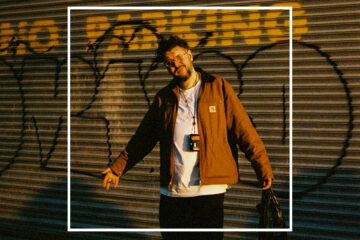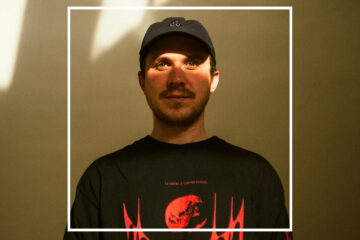Stones Throw has been around for 15 years now. Responsible for the releases of some of Hip Hop’s and music’s most versatile and influental artists out there. My World Premier by Charizma & Peanut Butter Wolf was the first record to come out in 1996 – that’s where it all began. Left-field Hip Hop has his origins with Stones Throw and is still strong. Representing a signature sound. In the recent years the label has signed artists from different musical genres; making its musical scope broader with every release. Madlib, Oh No, J Dilla, Mayer Hawthorne, Dam Funk, Guilty Simpson and Aloe Balcc are just a few of the names of the extensive catalogue, who have had their first releases and commercial breakthroughs on the label. Stones Throw is not only the home to progressive Hip Hop and music connected with it, it’s a powerhouse that shines new light on undiscovered artists and doesn’t cease to amaze with its creative output on a regular. Valentin Menedetter met Peanut Butter Wolf, the founder of the label, for a chat.
What actually caused you to found Stones Throw?
Peanut Butter Wolf: When I was a kid I always wanted to start a record label, in my early teens, a lot of the records I was buying back then were on independent labels. To me that was kind of glamorous, labels like Sunny View and later on Cold Chillin’. That was kinda like the beginning of Hip Hop labels too, major labels didn’t really know about Hip Hop – the only Hip Hop artist on a major label was Curtis Blow I think, at that time and that was Mercury and they did a good job with Curtis Blow but besides that all the big Hip Hop artists were on indies. So at a young age it was always in the back of my mind and I grew up in San Francisco Bay Area and I just knew a lot of talented people there – I just wanted to do it.
Audio: Charizma & Peanut Butter Wolf’s My World Premier
How old were you back then?
Peanut Butter Wolf: Stones Throw started in ’96 so I was like 26 I guess.
How do you deal with the digital possibilities like online distribution, as a label?
Peanut Butter Wolf: We do decent on iTunes and we have our own site as well www.stonesthrow.com where we sell phisically and digitally, of course we do phisicial through stores but our website has been getting more important as years go by.
What about the vinyl sales?
Peanut Butter Wolf: Oh yeah we still do decent on vinyl, of course. That’s the only good news that vinyl is going stronger than it was – even a few years ago. So that’s pretty cool.
Throughout the last years you discovered artists like Mayer Hawthorne and James Pants – the two of them can’t be considered Hip Hop artists…»Well I remember Dj Shadow putting out a record by the name Why Hip Hop sucks in 96, I felt kind of offended, and I was like, †ºNah Hip Hop ist still good out there!†¹«
Peanut Butter Wolf
Peanut Butter Wolf: Well I remember Dj Shadow putting out a record by the name Why Hip Hop sucks in 96, I felt kind of offended, and I was like, »Nah Hip Hop ist still good out there!« I love Hip Hop and I love stuff that’s not Hip Hop too. So when I started Stones Throw in the mid nineties I wasn’t interested in much Rock music or electronic music, but since then I kinda broadened I guess. I mean way before that in the eighties I was into all types of different music – so it’s kind of ironic that Hip Hop should be a part of everything. You know Hip Hop grew out of, or as my understanding grew out of a scene that was sick of Disco and wanted to show that there was something else. But by the mid 90s Hip Hop had some kind of tunnel vision, like it was sampling from all different sources but then it was all kinda sounding the same almost. Stones Throw stands for Hip Hop and it stands for music I like basically.
Do you do all the A&R work and the key decision on your own, or are there others too?
Peanut Butter Wolf: I really micromanage the artistic side of it, that’s how it started, it was just me and I had the control, I never wanted to give it up I guess. Stones Throw has ten or twelve employees but it’s a dictatorship (laughs). A lot of things I want to put out, I have to consider the staff and the artist too, cause if I’m signing an artist and the staff doesn’t like it the artist is not going to do well, the staff is going to be mad. So it’s not a good idea to do that. There’s ten different opinions in the label and you can’t please everybody you just have to believe in what you like and hope that other people like it. Or hope that you can find those people.
Audio: Yesterday’s New Quintet’s Solar Wave
Through your travels you get to see a lot of different crowds, how do you perceive the development of music and the taste in music in Europe?
Peanut Butter Wolf: Well if you look at the old jazz musicians from the sixties and seventies, the music they were doing wasn’t as popular in the US. They had to go to Europe and to Japan to get recognized and they brought that back to the U.S. Even artists like Quincy Jones, learning about Brazilian music. So that started for me when I first came to Europe with Charizma back in 1992. But regularily was after 1997 and that’s when I saw Stones Throw go into different directions.
Flying Lotus and the Beat Movement – signings of artists like Dam Funk and Dimlite on Now Again records. Were you trying to reach a certain crowd?
Peanut Butter Wolf: Well, Dimlite is Egon’s thing so you’d have to ask him about that. But Dam Funk, I don’t know I just always liked his music. I was working with this artist Baron Zen who was like a childhood friend of mine that made that Rock records in the eighties and they never came out, so I put them out with a couple of remixes and I asked Dam Funk to do a remix for that. And it seemed to me that he spent a lot of time on it and came up with somehting really awesome. So that’s where that came from – that was before I knew anybody doing this Beat music. I don’t look at Dam Funk in this category, but you know it’s all music at the end of the day.









